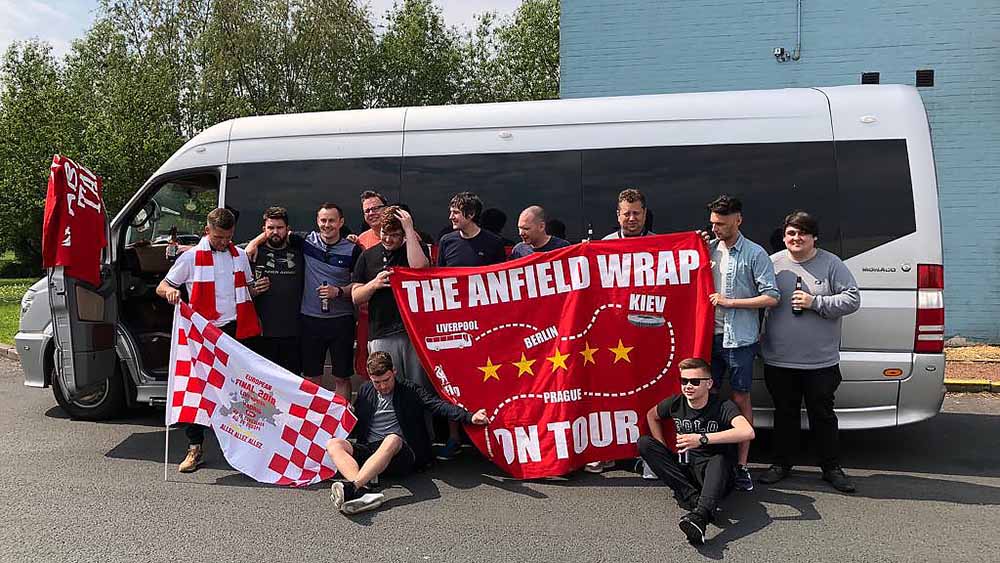Football fans will always be diehard supporters on the terraces – now they’re becoming reporters in their own right
In football, sometimes the presenters are as recognisable as the star players. Whether it’s Des Lynam and David Coleman running the legendary Grandstand or Gary Lineker and Gary Neville as the faces of the BBC and Sky Sports respectively, football presenters have always served as experienced, watchful observers helping fans connect with and better understand the beautiful game.
But in 2024, there is a new class of football presenter. Although it has been active for years by now, many simply haven’t taken notice. Yet how could football fans keep up with their beloved clubs any more than through Sky Sports or the BBC? Who else out there was best placed to do so? Well, why not the fans themselves?
This is the story of two Liverpool-based groups and how the pioneering ‘fan channel’ format turned football coverage on its head.
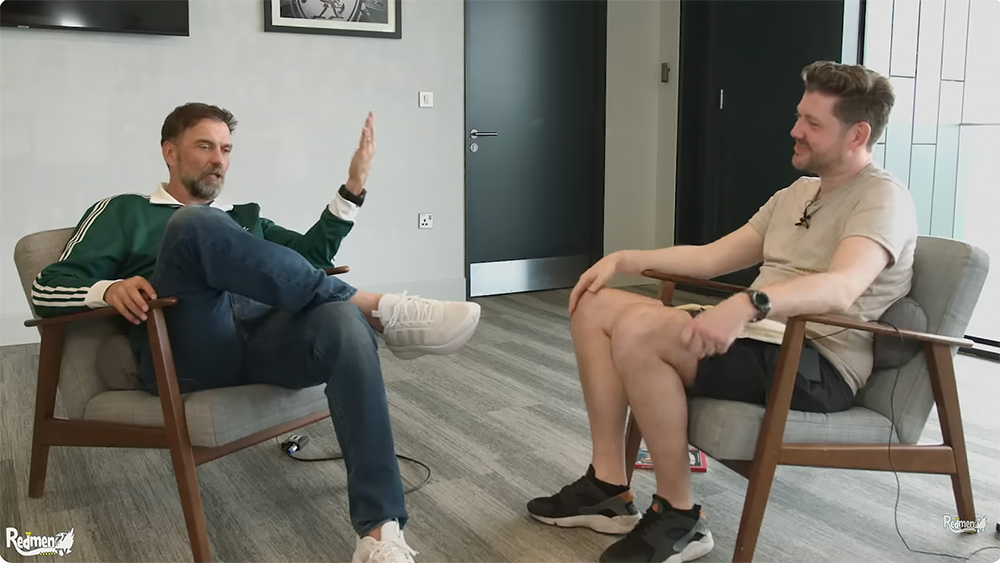
Back in 2007, devoted Liverpool FC fans Chris Pajak, Paul Machin and Aubrey Reynolds realised that something was missing from mainstream coverage of football – there was absolutely no common ground between how the fans and mainstream broadcasters talked about the sport.
“We were having conversations in the pub week in, week out, and yet they’re not the conversations that are being had on Sky Sports and the other broadcasters,” said Chris. “Why is that? They’re all ex-pros, they’ve got well respected opinions, but they don’t seem to be in touch with what everybody is talking about. Could we do something like that? Stick a camera in and see if something will happen?”
The three fans would launch their project in 2009 – RedMen TV. Chris describes their early output as video-based content that was something between Fantasy Football and Wayne’s World – an unconventional mix of sketch comedy and match reactions to Liverpool games that fans warmed to when they expanded to set up their YouTube channel in 2010.
It was good enough that fans were even buying DVDs of their work, which ended up being cut content from an episode offered to LFCTV, the club’s official TV channel.
RedMen were making a name for themselves from early on, including being featured by Norwegian TV channel TV 2 Sport in 2012
It soon became apparent, however, that the dream of ‘football coverage by the fans, for the fans’ was running headlong into reality – YouTube was a ruthless platform.
For a restaurant manager (Chris), a bartender (Paul) and a local TV producer (Aubrey), they didn’t have the luxury of modern, digital equipment and had to rely on borrowed cameras, tapes, and a considerable amount of time.
“We’d record for three or four hours on a Monday night, then post-match, and we’d record from when I finished work at about 8pm until 1 or 2am in the morning. It would take two and a half to three days to get the shows out, whereas now you just pick up the phone and you’re done. It’s mental,” said Chris.
It was nothing short of a crash course in a YouTube career. But YouTube took notice.
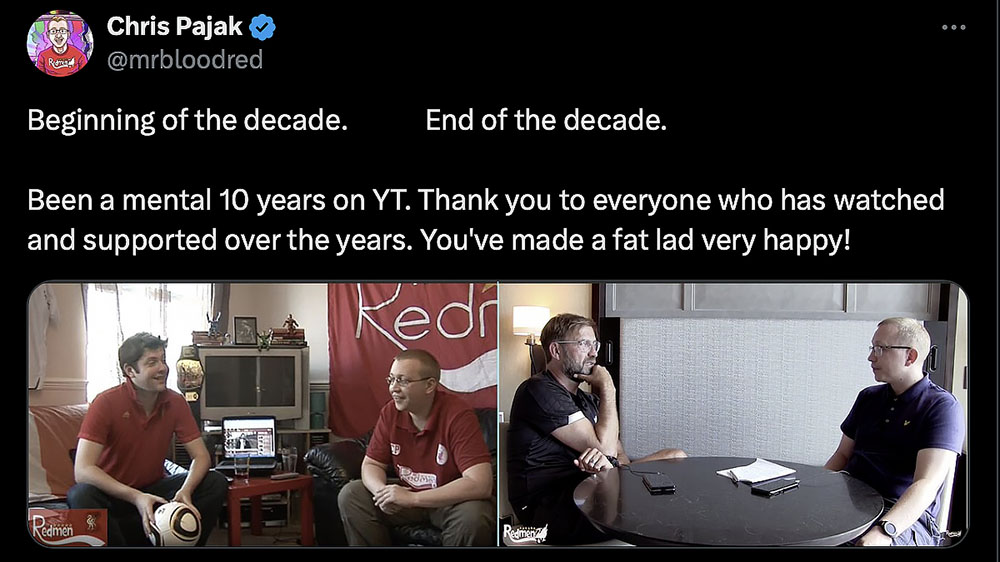
As RedMen found its feet in 2011 and at around 5,000 subscribers, it caught the attention of Jeff Nathenson, the Head of Football at YouTube at the time.
“One of the Heads of Sport at YouTube in came to us and was like ‘What you are doing is incredible, we’ve never seen anything like this on YouTube.’ They told us we were the very first fan channel in the world. We’d basically taken the medium of the fanzine and made it into a YouTube show, essentially for the 21st century,” said Chris.
Although RedMen had a preference for long form content, clearly the opposite of what YouTube’s algorithm liked, they quickly learned just what their audience wanted: pre-match predictions, full time results, instant analysis, not too far removed from what Jeff Stelling would be doing. Hardly a surprise that football fans wanted more Fantasy Football than Wayne’s World.
RedMen TV is almost unrecognisable over ten years later. With more than 500,000 YouTube subscribers and a combined 230 million views, the fan channel has become a leading organisation covering Liverpool FC from their studios in South Liverpool.
Their range of content has expanded significantly, building on their creation of a ‘watchalong’ where hosts effectively commentate on live games (whilst not showing the match itself to circumvent broadcasting law) to including tactical analysis, transfer debates, interviews with journalists and ex-players, even independently made documentaries – a framework of content that many other fan channels have since adopted.
RedMen has created some iconic moments, with one of the greatest coming when Liverpool goalkeeper Alisson scored against West Brom in 2021
With just ten members of full-time staff, output is fuelled by one thing above all else – passion. When news broke in July 2024 about Liverpool striker Darwin Núñez allegedly being involved in a fight during the Copa America semi-final against Colombia, team member Dan Clubbe was up at 5am corroborating with an American journalist who was at the stadium. The call was fully recorded, edited, and uploaded just hours later. That sense of speed is a big part of RedMen’s success.
“I think what we’re trying to do is to give fans a fuller understanding of what’s going on around their football club. It’s why we try and interview people who know more than we know,” said Chris. “We’re really reactive to things. We’re never going to break a news story, but we can react better than most people.”
It’s hard to overstate how much RedMen has cultivated a global fanbase, not too dissimilar to Liverpool FC itself. Ironically, it was during the Covid-19 lockdown that signified how much RedMen had cemented its place in the sub-culture of being a Liverpool fan.
“One of the best moments I’ve had during RedMen was watching Liverpool win the league. A consequence of Covid was that we brought watchalongs back on the channel because we had to do something and we got to share a moment with 25,000 other people. I can show my kids that, I can show my grandkids that,” said Chris.
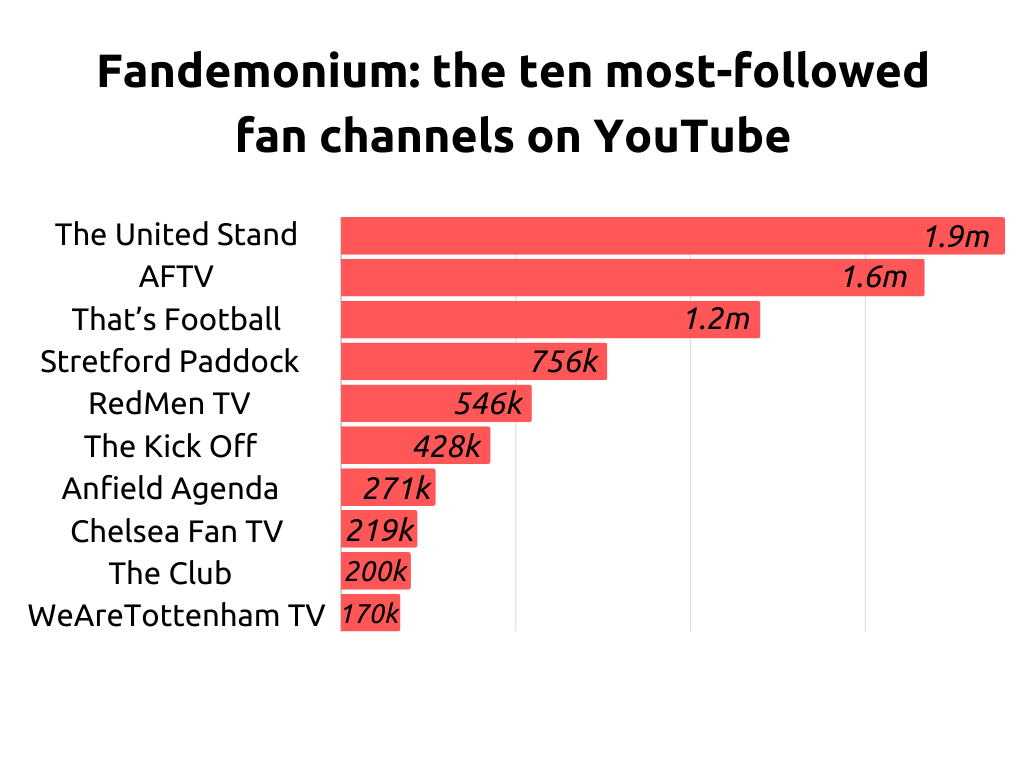
While RedMen is something of a pioneer of the fan channel, Chris is always aware of the fact that there is still room to improve. As the post-season review approaches, he is keen to maintain a relatively simple approach to work – enjoy it so that the audience enjoys it.
“It’s not like going to work, it’s just not. This is the hardest time of the year for us because there’s nothing to talk about. The fun stuff is the slog through the season, stuff that tires you out and everything else. But my word, when something happens, there’s no greater feeling than watching this office militarise itself.”
But just under eight miles away, in the shadow of the iconic Liver Building, militarising takes on an entirely different meaning when it comes to understanding the origins of another leading Liverpool fan channel – the Anfield Wrap.
Founded in 2011 as a weekly podcast, it was a time of recovery for the club as they were sold by unpopular owners Tom Hicks and George Gillett to Fenway Sports Group. But for many, including a young Josh Sexton, now an editor/producer at the group, the lack of awareness at just how deep-seated problems were at Liverpool FC was shocking.
“It got to its most dire point when there were threats of Liverpool going into administration. Fan organisations like Spirit of Shankly and Spion Kop 1906 were doing such good work allowing Liverpool fans to have a voice,” said Josh.
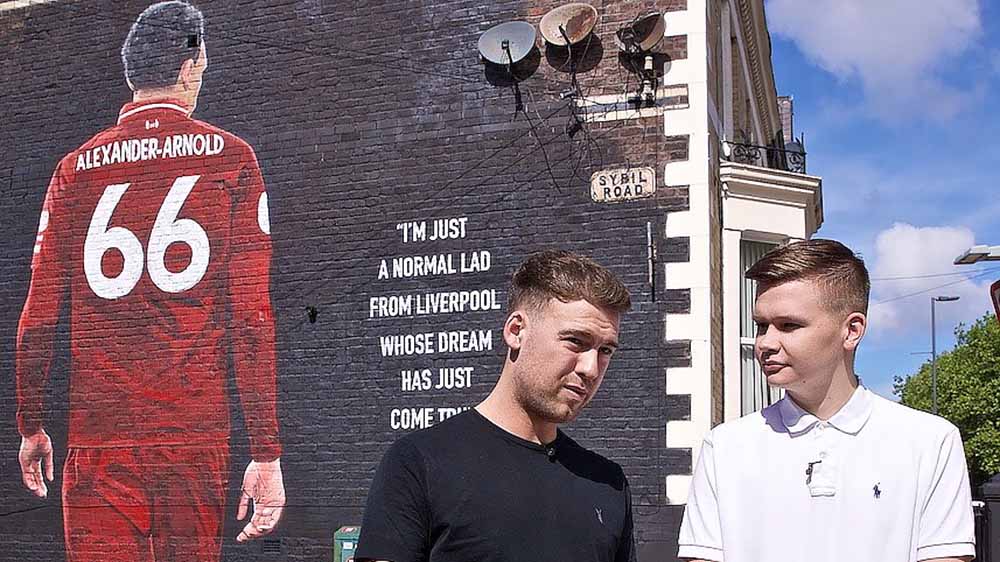
But creators Andy Heaton and Gareth Roberts realised at the time that Liverpool fans just like Josh now needed somewhere to hear about the issues affecting their club and to have their own voice heard.
“When I was just consuming football as a fan in 2011, I wasn’t getting an awareness of those issues because it wasn’t in the media. I think organisations like The Anfield Wrap stepped up in that time,” said Josh.
As the club rebuilt under the tenure of manager Brendan Rodgers and then the golden era of Jürgen Klopp, it allowed the team at the Wrap to better define their approach to providing this outlet for fan voices.
“The slogan we use at The Anfield Wrap is ‘Sharing the journey of Liverpool Football Club’ because we do believe that is a journey that’s worth shouting about and celebrating.”
More importantly, the team understood over time that the delivery of their work had to be a strong reflection of who they were as Liverpool fans.
Josh describes the Post-Match Pint as a fan channel in its purest form – digesting the last 90 minute performance with a drink and friends (Credit: The Anfield Wrap)
“There’s so many journalists who do great work and maybe not necessarily have the experiences of following Liverpool Football Club in the way that we have been clicking through the turnstiles,” said Josh. “We deliberately record a lot of our post-match content from pubs and places around the ground so that people who are from thousands of miles away can stick their headphones in and feel like they’re there.”
Josh claims the Wrap was the first fan podcast to introduce a subscription service, not too dissimilar to RedMen’s YouTube channel, and had to undergo the change that many fan channels experience – a hobby becoming a business.
“When I first started we had around 8000 paying subscribers and the price was £5 then. Now we’ve got around roughly 12,000 subscribers and the price is between £7 and £10. That idea of being able to continue to grow, continue to put the money that we make from subscribers back into what we do has become more of a deliberate strategy,” said Josh.
As any avid podcast fan will know, the key challenge for any one programme is the sheer amount of competition.
“It’s behemoths like the BBC who pose a threat to us because they are ultimately paid for by the licence payer so they can put out a million free podcasts. It becomes harder for people like us to push against that sort of overwhelming tide of free content because people get used to that idea,” said Josh.
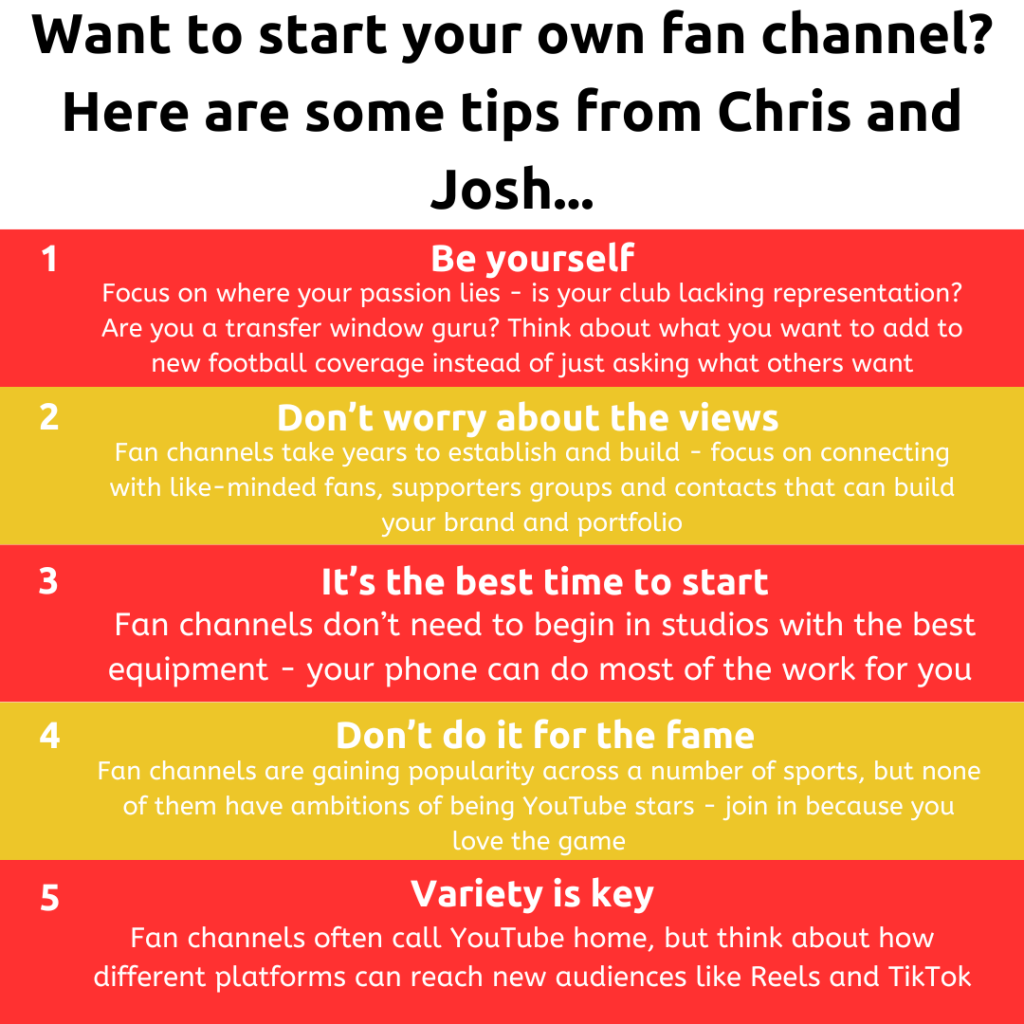
The Anfield Wrap has long since expanded their presence to other social media platforms in order to address the competition factor, most recently to TikTok, but still considers its original podcast its bread and butter offering to fans.
Competition wasn’t just with their media rivals, however, as there used to be something of a tense relationship with the club itself.
“It almost felt more abrasive around that time that when we did confront issues – the club just saw us as the enemy. Whereas now, the club see us as someone who can hold them to account ultimately so that the relationship sort of works both ways if we’ve gone really overboard.”
Liverpool fans certainly haven’t forgotten the club’s missteps in the past – notably attempts to copyright the name ‘Liverpool’, the sale of the historic Melwood training ground to property developers RedRow (which was eventually rebought and given to the women’s team) and the regular arguments revolving around ticket prices.
The Anfield Wrap serves very much as a host for open conversations just like these. It doesn’t seem long ago that the European Super League was announced, only for Anfield to be layered in protest signs and fans calling for owners John Henry and Tom Werner to sell up.
The European Super League was proposed to rival the Champions League, but most of its backers had pulled out just months after it was announced in 2021 (Credit: Washington Post)
Josh feels the Wrap occupies a unique position in the culture of the club, not necessarily replacing any aspect of it, but certainly becoming a subsection of what he calls the ‘trinity’ – the ownership, the players and the fans.
Their growth has allowed them to do things that many would think impossible for such a relatively young organisation. They created a five-part documentary charting Jürgen Klopp’s managerial career having partnered up with the German brewer Erdinger, interviewed the revered manager in an exclusive interview before his departure in May 2024, attended press conferences, living out the dreams of countless fans.
Their recognition also is widespread from professional journalism as well. Runner up at the 2018 British Podcast Awards, described as ‘one of the smartest innovators’ by The Independent and ‘essential listening’ by the Guardian, the Wrap’s influence is still growing. Despite that, it’s the Wrap’s ironclad values that inform their work, not their plaudits.
“You need to understand the collective spirit that works through all parts of the organisation. One of the things that [Bill] Shankly made a fabric of this football club was the idea of socialism and Shankly’s idea of socialism was that everybody pulls in one direction, everybody works hard and then everybody gets to reap the rewards of that,” said Josh.
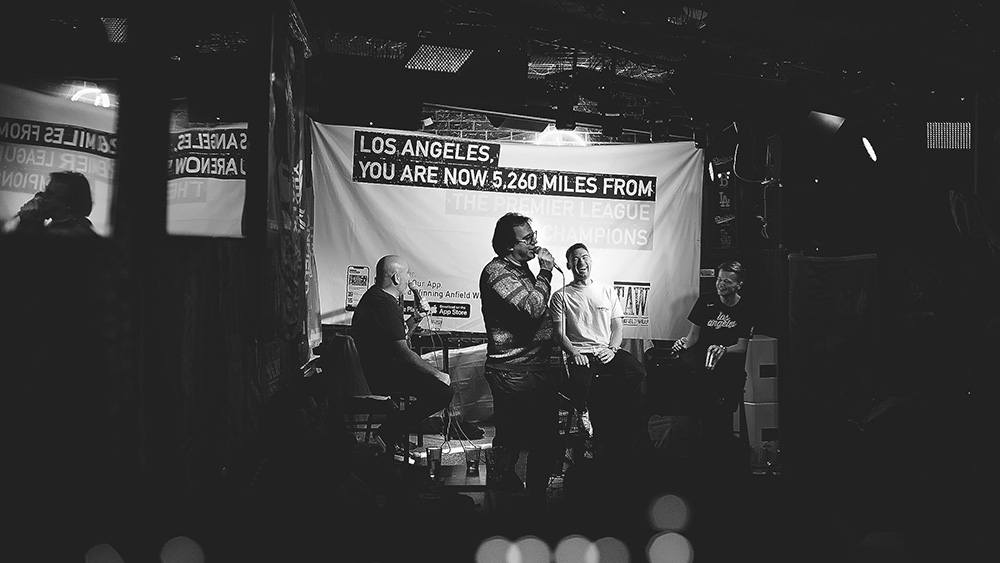
Josh fondly remembers the atmospheres of Shevchenko Park in Kyiv and Plaza Felipe in Madrid as ‘crescendos of supporter culture’ and the pride that the Anfield Wrap had playing its part, both sharing in the gloom and the glory of the Champions League.
As the club’s pre-season US tour gets underway, Josh and the Wrap will be looking to bring a slice of Anfield to America as they meet up with official supporters’ groups there.
Liverpool enters a new era as beloved manager Jürgen Klopp makes way for head coach Arne Slot, but Josh already knows of a familiar feeling that won’t change.
“I still get those butterflies at Anfield walking out for the first time in a new season. It’s bright blue skies and lush green grass in front of me. That childlike excitement does come back to you,” said Josh.
